-
"The tragedy of Nico Belic is that, narratologically and in terms of the game mechanic, he can never stop using people as a means rather than an end."
-
It's Oregon Trail, but where you take everybody's favourite emo band on tour of the states. Surprisingly deep and detailed, an affectionate tribute to Apple II entertainment and the rigours of being a touring rock band. It is very silly, and somewhat ace, and will be getting a blog post in due course.
-
"Tips and tricks only the pros knew, UNTIL NOW! Get ready to PWN up some NUBS on Xbox Live and get some MAD BP'S BRO!" I'm pretty sure I've played this guy.
-
"These are just various photos taken during the development cycle of the businessib. Enjoy them. We hope you think they are as hilarious as we do." Oh my word.
-
"If you keep the city and concentrate on putting more world into it, imaginativeness becomes the primary obstacle– you can add things into this city without having to add much physical space and new assets. There's legions of empty storefronts and empty buildings, waiting to be filled. And media– web sites, radio stations, tv shows– don't take up space either. Think of this cheap empty space as a place to tell new stories, because as a developer, you are good at this." Iroquois, hitting many nails on the head all at once, again.
-
The Guardian Open Platform launches, with their Content API, their Data Store, and a selection of client libraries for the API (one of which I did a smidge of work on). This is not just a good thing, it's a good thing Done Right, and I'm looking forward to what's next from the Open Platform team.
-
"A collection of accidents that happened while working on maps and other graphics." Bloopers from interactive infographics. Delightful; the patina and happy accidents of the 21st century.
-
Custodian is the Ruby gem for accessing the Guardian Open Platform Content API that James Darling, Kalv Sandhu, and I (although my contribution was minor) built. There's a Google Code link to it, but I'd imagine the github version is where the action will be.
-
"You may not know his name but you will certainly know his work: Morris Cassanova (aka Mr Chicken) designs and makes signs for most of the fried chicken shops in the UK." That's a good market to have sewn up, I'd imagine.
-
Jones annotates his screengrabs from the James Coburn classic; lovely to see it all captured so well, even if I'd disagree that the plot is a thing of "gossamer" – it's a _tiny_ bit thicker, surely?
Favourite Games of 2008
24 December 2008
It’s the end of the year, and that means time for lists. My books and albums lists are forthcoming – hopefully tonight or tomorrow – but in the meantime, I thought I’d kick off with ten of my favourite games of the past year.
There’s lots missing here, mainly owing to the fact I haven’t finished a lot of recent titles or given them the time they’ve deserved. What this is, though, is a good summary of what the gaming year felt like to me; ten games I enjoyed a great deal, and that I would recommend in a heartbeat to anyone not sure where to begin with 2008.
And so, in no particular order:
Far Cry 2
(Xbox 360, PS3, PC)
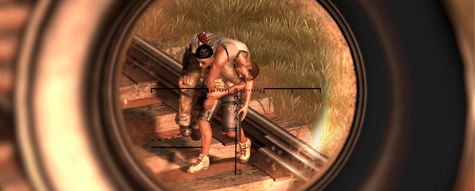
I have written enough about this already, but suffice to say: it sunk its teeth into me, after the initial hump I couldn’t play anything else, and at the end, it left me unable to play anything else for a while. Spectacularly beautiful, too.
Trism
(iPhone)
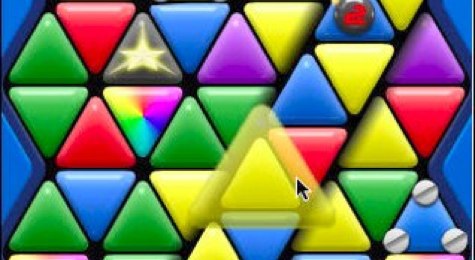
Trism began as an app for the jailbroken iPhone; it quickly made the transition to the official App Store platform when that opened up, and it has sold hundreds of thousands of dollars of copies since then, giving Demiforce a fantastic start to their company. And with good reason: it’s a great piece of game design, easy to learn, and hard to master. It also makes brilliant use of not only the iPhone’s capacitive touch screen, but also its tilt sensor. It’s a very pure puzzling experience, and I’ve already sunk many hours into it; it suits the pick-up/put-down rhythm of travel and play on-the-move idaelly. If you have an iPhone or iPod touch, this really is a no-brainer.
Geometry Wars Retro Evolved 2
(Xbox 360)

It’s still one of the best games on Live Arcade. It’s also still one of the best asynchronous multiplayer games you can play. Making your friends high scores the default high score table gives it a great competitive streak and really contextualises your performance: nothing’s more frustrating than having emailed a friend to say “hah, beat your high score” only to receive an response five minutes later informing you that the ball is firmly back in your court.
Adding variety to the original formula are the six game modes, slowly unlocked over time. They may all be variants on a theme, but they all still demand unique skills and become games in their own right: turning the Pacifism achievement from the first game into a mode in its own right was a great move.
Beautiful in high-def, easily explained to anyone who’s played a videogame in their life, it’s by turns accessible and challenging, and an essential purchase for new 360 players. Also, its social scoreboards give it great longevity, and prove what I already know: I’m nearly, but not quite, at the bottom of the pack when it comes to motor control. As long as I’m not last…
Braid
(Xbox 360)
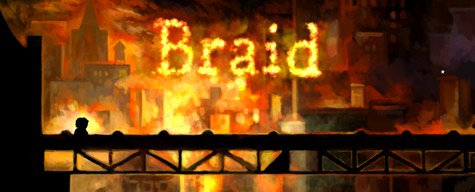
If there’s a measures of Braid’s success, it’s not to be found in its sales or metacritic scores, but in the sheer volume of verbiage devoted to it in the blogs, forums, and magazines of the gaming world. Thousands of words, all expended on the game, on the hype, and on what the hell it all means.
It wouldn’t have got that discussion if it wasn’t in some way good, and it really is: beautiful, challenging, and proof of the things that only games can do. It embraces game-native storytelling, wrapping its meaning tightly around its mechanics, and tells its tale through challenging, timeless puzzles and David Hellman‘s incredible artwork.
Perhaps it is a little pretentious; perhaps the writing is weak. Regardless of those facts, it’s exciting to see a game like this getting such a major launch on a mainstream, living-room platform, and as an artefact to push forward the casual – as well as professional – criticism of games, it’s a great starting point.
GRID
(Xbox 360, PS3, PC)

I always forget how much I like racing games. GRID is a very, very fine take on the racer. It’s beautiful, it’s fast, and it’s totally stripped down. GRID demonstrated that Codemasters really understood what making a game “cinematic” might look like: you condense it down into tight, exciting drama. So races take place over two-to-five laps, and in that time the AI will give you as good a catfight as any “realistic” simulator might over an hour. The rewind-time mechanic, as well as being wonderful to watch, removes the traditional racing-game reliance on the “restart” option; giving the game a pre-credits race, not to mention an ongoing narrative of running a team only helps with the Days of Thunder feel. Mapping Le Mans to a twenty-four minute endurance race makes it both exciting and endurable.
And, of course, it’s very pretty and fast as hell. The open-wheel racing is some of the most exciting driving games have to offer, in particular. The drift tournaments are weak, but stick to the touring cars, touge and open-wheel and you’ve got a hell of a game. The icing on the cake is the beautiful, free-floating typography. Solid, and surprisingly good.
Grand Theft Auto IV
(Xbox 360, PS3, PC)
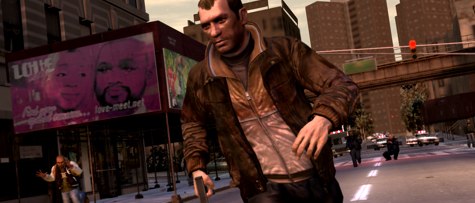
It’s on everybody else’s list, and I can’t really deny it: it’s a wonderful environment, and a staggering achievement. It’s not as smart as it likes, and it occasionally misfires but it delivers moments by the dozen. Shame the pacing of the islands feels wrong – after the majesty of Three Leaf Clover, being dumped in the New Jersey analogue is a bit underwhelming.
Also: multiplayer, with the right gang of people, is a total hoot. Whilst not the runaway online success that might have been hoped for, if you can get eight to sixteen friends online together, Cops and Crooks or Turf War will bring the fun pretty fast.
God of War: Chains of Olympus
(PSP)
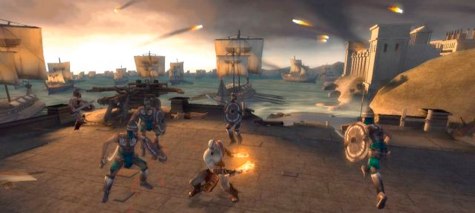
Well, it came out this year in the UK. I played this sitting by a roaring log fire, having spent my days clambering around the Lake District. It is not the greatest game of the year by a long stretch. It is, however, a wonderfully crafted experience: short it may be, but it’s put together almost perfectly: fantastic environments that barely repeat, thrilling combat that’s not too difficult, and one of the most striking in-game sequences I’ve played this year. It helps that the lack of direct camera control translates perfectly to the single-stick PSP. On top of all that, it looks almost as good as the PS2 versions – it’s a remarkable feat of engineering. I had a lot of fun with this, and if you own Sony’s much-unloved portable, you owe yourself to play this.
Left 4 Dead
(Xbox 360, PC)
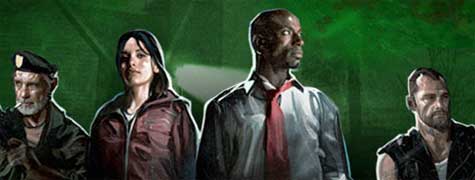
Gerard Way asked if it was any good, and the answer is yes, Gerard, it is. It’s bloody brilliant, although with the obvious caveat that it gets better with friends. Co-op gaming has slowly seen a slew of support and innovation in the past two to three years, and Left 4 Dead represents one particular pinnacle of that: an experience designed ground-up to be played not only co-operatively, but with real friends.
It’s not about team-mates, it’s about mates; how far would you go to save your friends from a Smoker? Quite far, as it turns out; I’ve noticed that in various pick-up groups, if I have to pick between someone I know in real life and someone I don’t, I’ll go with my friends first. To see such an unashamedly co-op experience – and one that could be described as reasonably hardcore if you hadn’t tried it – achieve such a level of mainstream success is very heartening. I put it down to the fact that Valve are such a talented gang of people, and so fastidious in their process. If you’ve not played through the director’s commentary, you owe it to yourself to do so, if only to understand that nothing in the final product is the result of chance.
Also: it’s great to see a game that puts the mechanic, indeed, the core technology, that really makes it – the AI – so far front-and-center. Personifying it as the AI Director was the stroke of genius that not only made players aware of it, but gave them someone to blame when they all died. Again.
World of Goo
(Mac, PC, Wii)
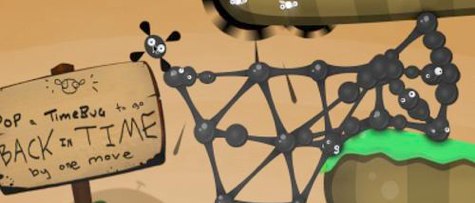
There are two reasons, I think, that World of Goo has captured a lot of people’s hearts this year. One is the game itself: the wonderful art; the delightful soundtrack; the just-one-more-go gameplay that carefully teaches you everything to know whilst keeping the challenge just high enough. But the other is the game’s mythology: 2D Boy, two guys working out of coffee shops for a year, giving up on the traditional industry to make the game they really wanted to. It’s the story we all wanted to believe in. The fact that both elements are so great is the real magic of World of Goo: risking it all, living the indie dream, really did lead to a wonderful game.
Gravitation
(Mac, PC, Linux)
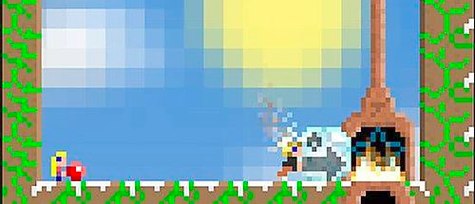
I like this more than Rohrer’s previous Passage. It’s a small, simple game, available for most home desktop platforms (Windows/OSX/Linux), about “mania, melancholia, and the creative process”. To say any more is to rob it of its impact. Once I worked out what you have to do to progress, I played on with a huge lump in my throat. To be heartbroken by a game this slight, this simple, in its 100 square pixel area, is quite something, and Rohrer makes games like no-one else.
Sometimes, the game changes
18 August 2008
I wrote a response in a comment on Leigh Alexander’s post at Sexy Videogameland on the “Four Month Bell-curve”, and felt it only fair to reproduce it here, given it’s touching on some ideas I’ve been batting around for a while. And, also, because back before we had comments, we used to respond to each other like this.
Well, sometimes the problem [with the drop-off in interest after you play a game after launch] is that the game changes.
With GTAIV, there are three phases to the player’s relationship with the city. To begin with, you have the shock-of-the-new: a whole world you’re washed up in, lost, just like Niko. You empathise with how lost Niko is, and you slowly learn to love Liberty City.
The second phase is feeling like you fit in – you know the shortcuts, you don’t always need the GPS, and you take pride in every minute you shave off journey time. This is what it felt like a while after moving to London – I felt native, rather than fumbling around like a tourist.
And then you hit this final phase, where you’re no longer even thinking about the neat shortcuts; you’re just picking up the mission, going where you gotta go.
That’s just commuting. And GTAIV turns into commuting about 1/2 to 2/3 of the way through, really. I still love the city, but man, it feels like work.
I’ve recently started World of Warcraft, and bits of that game turn into commuting very, very fast – even though I’m still going “wow” at all the new locations my friends charge through.
I don’t know; I think there’s something about the higher fidelity that makes me concentrate on the artifice to begin with, and only when I tire of the artifice is the game stripped back to raw mechanics.
To use your Sonic example – the distance between the raw mechanic and the artifice is much smaller than say, in GTAIV or Bioshock – and so the “commuting” phase never really kicks in. The game is so focused on making you enjoy the act of being in it, stripping away unnecessary walking between Acts or menu interfaces… it’s an easy game not to tire of. By contrast, I find I tire of games more easily than I used to.
But there’s still joy to be had going back. I went back to Bioshock a few weeks ago and have ploughed through the final 75% of the game – and am about to finish it. I’m really enjoying it, and I think being a way from the hype cycle has helped that. I’m looking forward to doing the same to GTA in the near future.
And, in the meantime, I’ve found staying out of the bellcurve – the hype cycle, if you like – has helped me enjoy games like never before. It’s lovely to be surprised by a new game – something we miss out on a lot now.
GTA IV: Characterisation Through Interaction
10 July 2008
Iroquois Pliskin has an excellent blog post from a while back about the way Grand Theft Auto IV is torn in its characterisation. It’s a great post, and well worth a read. And it also made me think:
In GTAIV, Niko Bellic has the option to socialise with the friends and acquaintances he meets throughout the game. These have little bearing on the plot, but are entertaining minigames, with some fun dialogue trees: darts, bowling, pool, drinking, and dating girls. Being friendly to certain characters may also have benefits in the long run – neat little tools and tricks you can summon with a call from the in-game mobile.
These games are totally optional, of course; you can happily play the game without seeing too many of them. But Iroquois’ piece made me realise that these “friendship games” aren’t just there for entertainment value, or for the neat bonuses you can get later in the game.
They’re there for characterisation – and a very specific kind of characterisation.
Niko is violent, Niko does bad things. You have a choice: you can temper that, by saying “but my Niko is also a good man: he’s nice to the girls he dates, he hangs out with his friends, he’s a good cousin to Roman“. Or you can turn you back on your friends, and a healthy, sensible social life, and focus entirely on the life of crime.
To play the game as it’s meant to be played, you can’t avoid the life of crime. But the player has a choice as to how much they temper the life of crime, and their malevolant sandbox antics, with the social-simulation aspects. If Niko becomes, essentially, psychotic – only focused on completing mission objectives, and not living the life – then who’s to blame but the player? To quote Iroquois:
There are some advantages for cultivating these relationships, but in general you get the idea that they are put in the game in order to give you a better perspective on your character. The portait of Niko that emerges is very well-drawn, and he emerges as a violent but ultimately sympathetic figure, a decent man who has been drawn into a life of expert violence against his own best efforts.
I think Niko is much more likely to emerge as “ultimately sympathetic” if the player makes the effort to round out his character. The cut-scenes and plot points the player is railroaded into go someway to providing that characterisation, but they provide that characterisation in dialogue and narrative. When the player helps create that characterisation through behaviour and gameplay, then the effect on the player’s understanding of Niko is much more deeply embedded.
Developing characterisation not through narrative but patterns of gameplay elements. I like that.
(Also: I can heartily recommend Iroquois’ blog, Versus Clu Clu Land)
Killing Jeff: Epilogue
04 June 2008
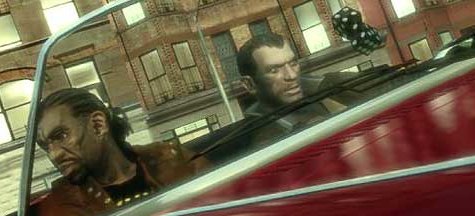
It only seemed appropriate to post an update to my tale of morality in Liberty City, given that Jeff is now dead. It’s also appropriate, this time around, to talk slightly less in the first person.
Once again, the player bumps into Jeff on the street – a small blue icon on the map. Niko bumps into him; he’s staring through a pair of binoculars at a house across the road. Niko is really unenthusiastic about meeting Jeff again, which I was pleased about. One trend that emerges throughout GTAIV is that whilst Niko has no hesitation about doing dirty work, that’s all very dependent on the reasons behind it. He’s angry that Brucie made him kill people simply because Brucie was hopped up on steroids, for instance; he’s less angry about crimes that fit within his moral spectrum.
Niko is really angry with Jeff. This made me feel somewhat relieved, if only because it felt like this was going to pan out a bit better. It turns out that Jeff has remarried (an instance of GTA’s somewhat liquid attitude to time) and is sitting watching his wife meet her ex. Of course, he’s decided this is a bad thing, and he wants Niko to kill her.
Niko’s having none of it, and gets quite angry with Jeff. Jeff starts yelling; Niko is “just like all the others“, it seems, and Jeff crosses the road to do the deed himself.
At this point, I’m thinking: is this where I get to kill Jeff, right? This is where Niko gets to demonstrate a wider spectrum of his morals.
And then a supercar piles down the street and runs Jeff over. He bumps over the windscreen, scattering the contents of his wallets, and lies splayed on the pavement. A lawyer-type leaps out of the car, gets on the phone, starts telling the police he’s had an accident. Jeff is still, splayed in the road.
Jeff has been killed in an accident appears, as a legend at the bottom of the screen.
I’m glad; I’m disappointed; I’m chastised. I’m glad he’s dead. I’m disappointed I didn’t get to kill him. I’m chastised for thinking about murdering a civilian.
The Jeff arc is a tiny, optional, three-mission plot in GTAIV, and I’m sure many players won’t experience it. I’m not sure it does much for the game’s misogynist reputation, which is something I am still sitting on the fence about – I have issues with some of its characterisation, for sure, but am not convinced of all the criticism thrown at the game. At the same time, it addresses an interesting issue that hasn’t really come up in the series (even in San Andreas, where it might have been an obvious fit): namely, the gap between criminals and civilians, and also more objective viewpoints of “good” and “bad”. The game is so heavily based upon subjective morals that it’s a really interesting shift of perspective.
Whilst the Jeff missions were presented as a real arc, rather than a series of disparate events, I’m still totally frustrated by the lack of freedom offered in the second Jeff mission, which was really quite unpleasant and made me genuinely angry. Still, I’m glad I played through to the end of the arc. For what it’s worth, there was a sense of closure.
Killing Jeff
18 May 2008

Update: I mistakenly called Jeff “Phil”. No idea where that came from. My bad.
Jeff should be dead.
I met Jeff on the street. He was just a blue blip on my minimap, to begin with. I’d seen him around for a while, but I was now passing right by him, and I was on foot, so I thought I’d head over to see what the blip was all about. And then Jeff started talking, and he wouldn’t shut up.
Jittery, paranoid. Babbling about how his wife’s cheating on him. Kept calling her bad names – bitch, whore. Not cool. But I listen. Anyhow, Jeff wants me to follow her when she leaves the apartment one day, and see where she’s going. Seems like an easy buck, and if he’s wrong, he’ll be glad to know that, right?
So I pull up outside the apartment, and watch her leave. Red Feltzer coupé. Very nice. Tail her for a few blocks, and she pulls up at a café.
I head inside, see her talking to some guy. Smart, suit, smells like a lawyer or something. Anyhow, I keep my distance, a few blocks over, snap a few pictures on my phone. I mean, if Jeff knows the guy, this all might blow over, right? Can’t help but listen to them. And, sure enough, there’s nothing sinister – not yet, anyhow. Just her, talking to some guy she knows – work colleague, maybe – about how jittery and paranoid Jeff is. How it’s driving her nuts, she’s not sure what to do. No affair, no cheating. Just jittery, paranoid Jeff.
I message him the pics, and he flies off the handle and hangs up. Not exactly cool; let’s just hope it all blows over.
Jeff calls me in the night. I’ve just bought a suit for this interview I’ve got tomorrow, big-shot law firm. Need to look the part. Anyhow, I need some sleep, but Jeff’s just yelling at me, screaming, telling me he needs to see me. He’s in a parking garage near Roman’s new apartment.
Parking garages never bode well.
And there’s no option to say no. No conversation branch, no choice; I picked up the phone and I got landed with Jeff – much like when I wandered up to him and he threw me into a mission. Already, I’m sick of Jeff.
So I go to the garage, pull up inside, and there’s Jeff, jittering about, holding himself. Things aren’t good. “Jeff made a mistake,” he tells me, not realising that talking in the third person is a dead giveaway for crazy. Tells me his wife’s had an accident. What kind of accident, I say. Jeff shows me.
The body is in his nasty little hatchback.
I have met many bad people in Liberty City, but Jeff is the worst. Jeff is not a criminal. He doesn’t deal drugs, he doesn’t rob banks, he doesn’t traffic people. He’s your ordinary-decent-citizen. Jeff’s wife is blameless in all of this. And yet he killed an innocent, decent woman, for no apparent reason, and he keeps talking about her like that, and I can tell that Niko hates Jeff, and feels a bit sick, and I hate Jeff, and feel a bit sick.
Jeff gives me the car keys, and sits on the tarmac, crying. He wants me to dump the body.
I’ve never intentionally killed civilians. No joke. Maybe the odd auto accident, but no shooting. Everyone who’s died by my hand has been cop or crook – somebody who was shooting at me, or who would kill me later if I didn’t kill them now. Those are the rules, right?
Anyhow, Jeff is sitting on the pavement in front of me, and I’m thinking that I don’t want his phonecalls in the night, and I don’t want his guilt, and I don’t want him dragging ordinary, decent people into the kind of shit you shouldn’t even choose for yourself (and heaven knows I’ve tried not to), and I realise that a moral decision is presenting itself to me. And there’s only one moral decision I can make in Liberty City.
I pull out my piece and put three rounds into Jeff. He doesn’t even look up when I draw the gun, he’s too busy crying. Sure, he’s not well, but he’s also gone too far, and I don’t want to have anything more to do with this. He rolls back on the ground, must have hit him in head and torso. I hate, you Jeff.
A black-and-white lights up behind me; must have been prowling the parking garage. I leap into Jeff’s car and head for the river. Doesn’t take much ducking and diving to avoid the single patrol car and lose the heat. Now I’ve just got to dump this car and dump the body. He didn’t even put it in the boot; it’s lying around on the backseat, and I can’t avoid seeing it as I’m driving. Still gives me that lump in my throat.
Towards the river, must be barrelling along at about 40. I lurch off the road, head straight for it. It’s hard judging distance at speed, and I throw open the door a fraction too late, because rather than rolling out onto the grass, I end up leaping out above the water. The car goes headfirst into the river as I dunk myself in it.
New interview suit, soaked already.
Jeff’s dead. Jeff’s car’s in the river, along with Jeff’s wife’s corpse. Poor Jeff’s wife. Wish I’d never met him.
I clamber out of the river, and head for home; time to catch some sleep before the big interview.
My cellphone rings.
It’s Jeff.
Jeff should be dead. He was dead to me the second he showed me the corpse in the back of the Blista; he was deader when I shot him, watched him crumple. And now he’s on the phone to me again, like nothing’s happened. I can’t describe my anger; all at once, I’m furious.
And the city fades away and the game wells up over me and I want to scream at Jeff, and scream at Rockstar, and empty my pistol into Jeff, tugging on the joypad trigger again and again until the virtual gun clicks dry, so that he can never come back again, never hurt anyone again. I made a choice – a valid choice in the game world – and for the first time in this game it had no repercussions. I’d have taken any amount of heat just to put Jeff down. But the game wouldn’t let me. The game thought he deserved to live. Saddened, I turn the 360 off.
Grand Theft Auto IV is a wonderful game; it resists any tarnishing with terms such as “fetch quests” and “escort missions” by virtue of the solidity and coherence of world it presents. It rises above the stereotypes of previous games and attempts to create genuine characters, however simple or cartoonish. Few of them are truly evil, few of them can ever be redeemed; they all tread the awkward line between survival and violent death.
Jeff was different; Jeff was the first time that I’d met a character I (and, indeed, Niko – the player’s character) found distasteful. For the first time, the game gave me no choice but to take his missions the second I approached him or picked up the phone. I could have coped with Jeff if I felt like I’d had the opportunity to do something – anything – about him. The game gave me that opportunity, and took it away, and it shouldn’t have done that. Not if it wants me to take the “freedom” it offers me seriously.
I’m going to keep playing, but every time my phone rings, I’ll pray it’s not Jeff, and if it ever is Jeff, I’m going to remember what I want to do to him – and why I want to do that to him – before I hit “reject”.